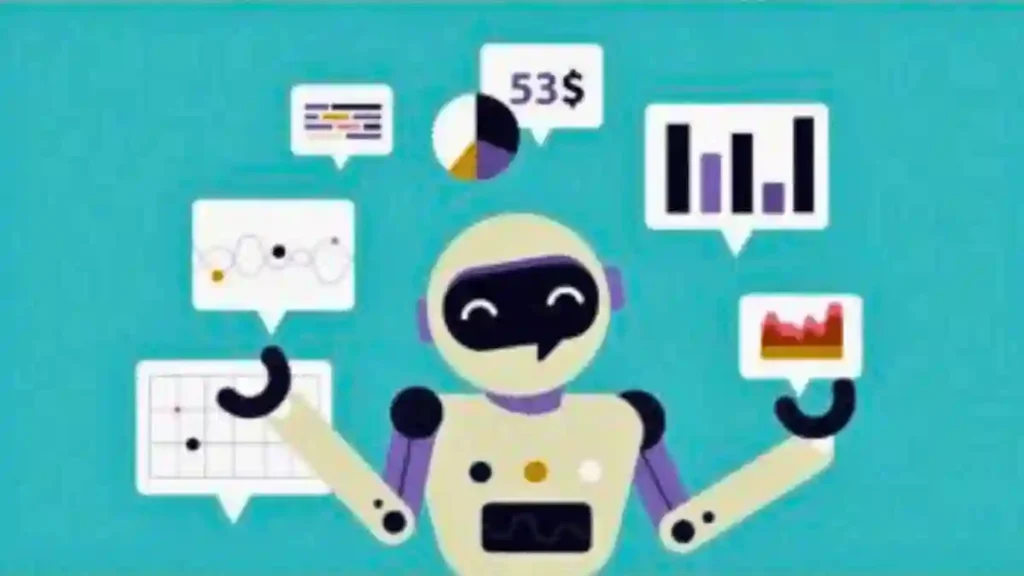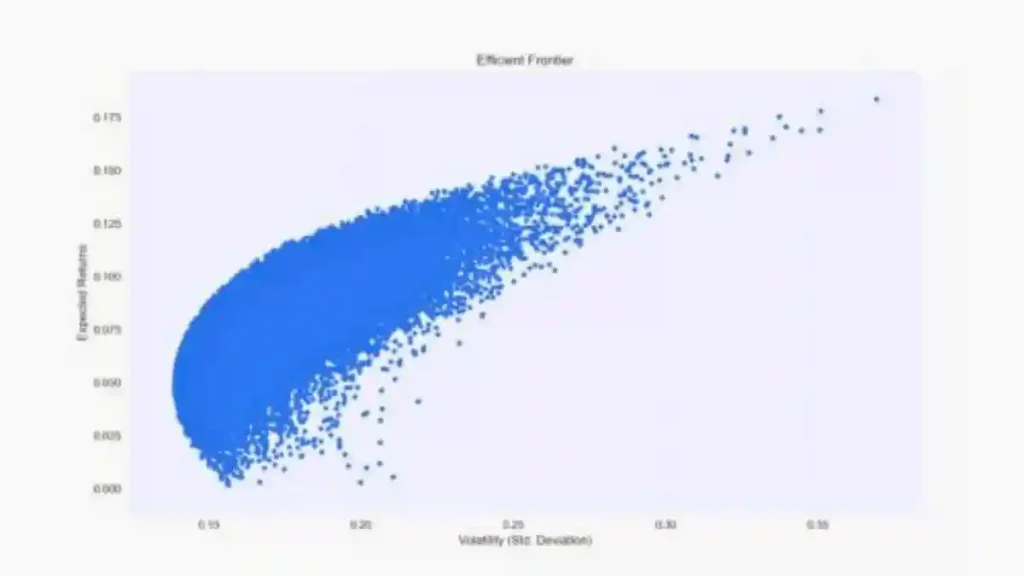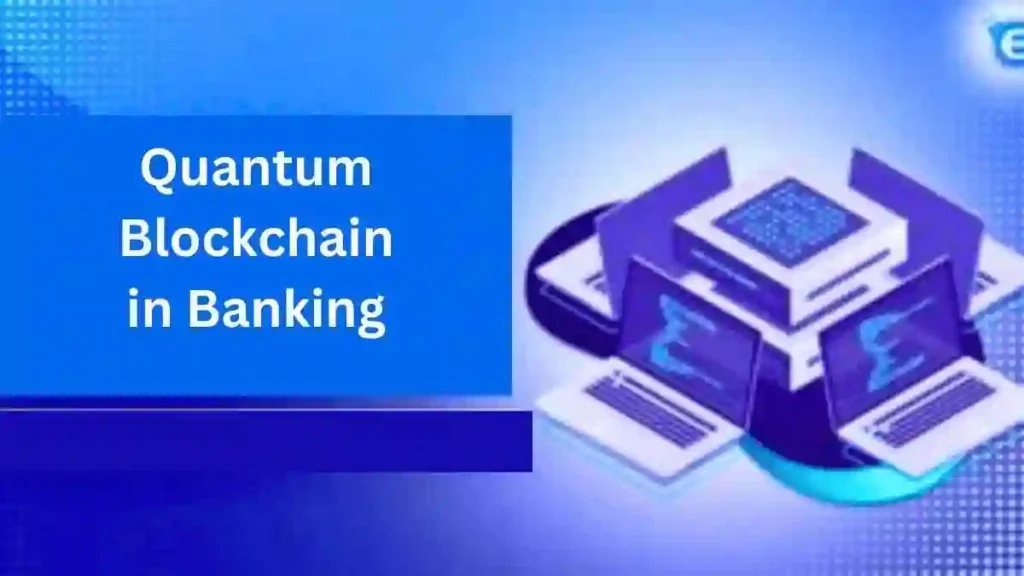For Regular Latest Updates Please Follow Us On Our WhatsApp Channel Click Here
Last updated on October 7th, 2024 at 02:23 am
Summary:
Explore the Impact of Quantum Computing, AI, and Blockchain in Finance. Discover how these technologies reshape banking, risk assessment, and customer service. Unveil the challenges and opportunities ahead. Join the Future of Finance with Quantum AI. Engage Now
For Regular Latest Updates Please Follow Us On Our WhatsApp Channel Click Here
In the fast-changing realm of finance and banking, modern and high-tech tools are making a big impact. Quantum computing, AI automation, and blockchain are catching a lot of attention because they might change how banks do things. These technologies could shake up the usual banking methods. This article looks into how these technologies come together and talks about the good things they can bring to banking, as well as the problems and chances they might bring.

Quantum Computing in Banking
At its core, quantum computing harnesses the principles of quantum mechanics to process information in ways that classical computers cannot replicate. This enables quantum computers to perform complex calculations exponentially faster, a quality with profound implications for the banking sector. Traditional risk management practices involve intricate simulations and valuations. Quantum computing’s speed and parallelism can revolutionize these processes, leading to more accurate risk assessments and efficient decision-making.
However, the path to quantum integration isn’t without hurdles. Scalability remains a challenge, with current quantum systems struggling to handle extensive financial datasets. Additionally, maintaining error correction and ensuring interoperability with existing banking systems poses ongoing concerns. Regulatory frameworks are yet to fully accommodate the novel capabilities of quantum computing, adding another layer of complexity.

AI Automation in Banking
AI automation, driven by machine learning algorithms, has already demonstrated its prowess in streamlining banking operations. By automating routine tasks, banks can allocate resources more efficiently, leading to cost savings. Customer service is a prime beneficiary of AI automation, offering personalized solutions round-the-clock. Chatbots and virtual assistants provide quick responses, enhancing customer satisfaction.
However, deploying AI automation necessitates addressing challenges. Ensuring data quality is crucial for accurate decision-making, and the security of sensitive customer information is paramount. Ethical concerns about AI’s potential biases and the need for human oversight in critical scenarios underline the importance of responsible implementation.

Quantum AI in Finance
The fusion of quantum computing and AI, known as quantum AI, holds immense promise for revolutionizing financial processes. Traditional portfolio optimization methods involve exploring numerous asset combinations for the ideal risk-return balance. Quantum AI can perform this optimization at an unprecedented speed, enabling more informed investment decisions.
Yet, realizing the potential of quantum AI requires overcoming barriers. Developing quantum algorithms necessitates expertise in both quantum mechanics and AI, a rare combination. Additionally, accessing quantum hardware and fostering collaboration between quantum physicists and financial experts are pivotal for progress.

Quantum Blockchain in Banking
Blockchain, renowned for its distributed and immutable nature, meets its match with quantum cryptography. Quantum blockchain enhances security and privacy, creating an unhackable environment for transactions. Quantum entanglement, a phenomenon unique to quantum mechanics, can facilitate verifiable data transfer and storage, addressing concerns about data integrity.
Nevertheless, quantum blockchain grapples with familiar challenges. Scalability remains a hurdle, and ensuring interoperability with existing financial systems is essential. Regulatory compliance also demands attention as the technology evolves.
FAQs on the Topics of Quantum Computing, Quantum Computing for Finance, Quantum AI, & AI In Finance, Banking & Blockchain Answered Here:
What are the applications of quantum computing for finance?
Quantum computing has a high potential to revolutionize the finance industry or financial sector.
Here are some of the key applications:
Securities Pricing and Portfolio Optimization:
Quantum computers can assess a range of potential outcomes using algorithms and models that calculate statistical probabilities. This can lead to more accurate securities pricing and portfolio optimization.
Risk Management:
Quantum computing can help financial institutions more accurately and timely assess risk, which remains a serious challenge. This is particularly relevant in the context of rapid changes in how banks and other market participants assess and price risk of different asset classes.
Customer Targeting and Prediction Modeling:
The data modeling capabilities of quantum computers are expected to prove superior in pattern discovery, making classifications, and making predictions. This could be a game changer for customer targeting and prediction modeling.
High-Frequency Trading:
Quantum computing can process vast amounts of data at superfast speed, which is crucial for high-frequency trading.
Cryptography:
Quantum computers can also be used in encryption-related activities, enhancing the security of financial transactions.
Fraud Detection:
Quantum computing can help in detecting fraudulent activities by analyzing large or unstructured data sets.
Machine Learning and AI:
Quantum computing can enhance machine learning and AI capabilities, leading to more sophisticated financial models and predictions.
It’s important to note that while the potential of quantum computing is immense, the technology is still in its early stages and there is a way to go before it can be rolled out at scale.
What are the applications of quantum computing in banking?
Quantum computing has a very high potential to significantly transform the banking sector.
Here are some of the key applications:
Faster Payments Mechanism:
Quantum banking revolves around quantum computing and blockchain to build a faster payment mechanism that is also cheaper to operate.
Data Processing:
Quantum computing is able to process data 10 million times which is faster than supercomputers. This astounding capacity can revolutionize banking functions, such as analyzing extensive unstructured data for financial forecasting or market simulations, leading to deeper insights into financial markets and trends.
Risk Assessment:
Quantum computers can help banks more accurately and timely assess risk. This is particularly relevant in the context of rapid changes in how banks and other market participants assess and price risk of different asset classes.
Fraud Detection:
Quantum computing can help in detecting fraudulent activities by analyzing large or unstructured data sets.
Portfolio Management and Construction:
Quantum computing can significantly improve portfolio management and construction, currency arbitrage, trade settlements, analytics-driven CRM (customer relationship management), credit scoring, risk modeling, tax-loss harvesting, and derivatives pricing.
Cryptography:
Quantum computers can also be used in encryption-related activities, enhancing the security of financial transactions.
It’s important to note that while the potential of quantum computing is immense, the technology is still in its early stages and there is a way to go before it can be rolled out at scale.
Is quantum computing used in blockchain?
Yes, quantum computing has significant implications for blockchain technology.
Here are some key points:
Quantum Computing and Blockchain Technology:
Quantum computing can revolutionize technology, impacting blockchain’s future and reshaping data security and applications. Quantum computers are able to peruse vast amounts of data quite faster than existing systems.
Threat to Blockchain:
Some experts believe that advances in quantum computing could pose a threat to blockchain, as quantum computers might be able to break the encryption of even the most advanced blockchains.
Quantum-Resistant Cryptography:
The risk posed by quantum computing has actually led towards a growing interest of the blockchain community in creating quantum-resistant or post-quantum cryptographic algorithms that are secure against quantum attacks.
Quantum Blockchain:
There are ongoing research and advancements in the field of Quantum Blockchain. Quantum computers can use Shor’s algorithm to break some popular public key algorithms in polynomial time. Furthermore, Grover’s algorithm can also be used by quantum computers to accelerate the generation of hashes which can cause the entire blockchain to recreate blocks.
Future of Data Security:
Alternatively, quantum computers could replace blockchains as a vastly improved method of future-proofing data.
It’s important to note that while the potential of quantum computing is immense, the technology is still in its early stages and there is a way to go before it can be rolled out at scale.
What is the application of quantum computing in AI?
Quantum computing has significant implications for artificial intelligence (AI). Here are some key applications:
Processing Large Sets of Data:
We produce 2.5 exabytes of data every day. Quantum computers can process this data much faster than classical computers, leading to better business insights and models.
Solving Complex Problems Faster:
Quantum computers are able to complete calculations within seconds, which would take today’s traditional computers many many years to calculate.
This can be applied in various AI use cases across industries such as maritime logistics, electric vehicles, semiconductors, luminescence, and power.
Enhanced Machine Learning and Pattern Recognition:
Quantum artificial intelligence (QAI) applies the transformative power of quantum computing to improve AI products, such as machine learning algorithms, neural networks, and large language models (LLM). This enhances AI’s pattern recognition capabilities for image and speech recognition, natural language processing, and data classification.
Integration of Multiple Sets of Data:
Quantum computing can integrate multiple sets of data, providing deeper insights into financial markets and trends.
Quantum AI:
Quantum AI is an emerging field that combines quantum computing and AI. The integration of quantum computing with AI systems could unlock new frontiers in computing power, algorithm efficiency, and general problem-solving capabilities.
It’s important to note that while the potential of quantum computing is immense, the technology is still in its early stages and there is a way to go before it can be rolled out at scale.
What is blind computer?
The term “blind computer” is not indicative of a specific kind of computer. Instead, it refers to the utilization of computers by individuals who have visual impairments, made possible through assistive technologies.
These assistive technologies encompass both hardware and software solutions that enable visually impaired individuals to interact with devices such as computers, smartphones, and tablets, which are typically designed for sighted users. The range of these tools is vast, from simple screen magnifiers to advanced refreshable braille displays.
One of the key software solutions used by visually impaired individuals is a screen reader. This software reads out the information displayed on the screen using a synthesized voice or outputs the information to a braille display.
Assistive technology (AT) refers to any device or service that aids individuals in overcoming the challenges posed by their disabilities. This includes voice recognition software that types as the user speaks, smart glasses designed for visually impaired individuals, and more.
The term “blind typing” or “touch typing” is also appropriately relevant here. It refers to a typing technique where the typist does not need to look at the keyboard and uses all ten fingers. This skill can be especially beneficial for visually impaired individuals.
In summary, a “blind computer” is a term used to describe the use of computers by visually impaired individuals, facilitated by a variety of assistive technologies. These technologies allow visually impaired individuals to access and interact with digital information in a manner similar to sighted individuals.
What is blind quantum computation?
Blind quantum computation is a cryptographic method that enables a user with limited quantum resources to perform a quantum computation on a remote quantum computer without revealing any information about the computation to the remote server.
In simpler terms, it allows a user (commonly referred to as Alice) who lacks advanced quantum technology, to delegate her quantum computation to another entity (commonly referred to as Bob) who possesses a sophisticated quantum computer. The crucial feature of this protocol is that Bob remains ignorant about Alice’s input, output, and computation process.
This protocol is designed to securely delegate quantum computation to an untrusted device while preserving the privacy and in some cases, the integrity of the computation. It’s a notable advancement in quantum computing,
especially in the realm of cloud computing and artificial intelligence.
The concept of “blind quantum computation” was first introduced by Arrighi and Salvail. They described a method to encrypt certain problem instances so that they could be delegated while maintaining privacy.
Recently, a team of researchers at Oxford University has made a significant breakthrough. They have developed a method that allows millions of users to access quantum computing from their homes using blind quantum computation. This method operates over existing fiber optic systems and provides secure quantum computing.
In summary, blind quantum computation is a remarkable protocol that enables secure and private quantum computations to be performed on a remote server. It ensures that the user’s data and algorithms are not revealed to the server.
This is a significant stride towards the practical and widespread application of quantum computing.
What is quantum computer vision?
Quantum Computer Vision, or QCV, is an innovative approach in computer vision that utilizes the capabilities of quantum computing.
Quantum computers, unlike their classical counterparts, use quantum mechanics to perform computations. They have the potential to solve certain types of computational problems, including those that are combinatorial in nature, much faster than classical computers. These types of problems are common in many computer vision applications, making quantum computers potentially beneficial in this area.
The goal of Quantum Computer Vision is to modify existing computer vision problems so that they can be solved using quantum computation. However, this is a complex task. For example, while many computer vision problems involve continuous variables, quantum annealing, a technique used in quantum computing, is especially effective for optimization problems involving discrete binary variables. This often requires a complete overhaul of the problem formulations.
Despite these challenges, the introduction of quantum computing has led to new research opportunities in computer vision. From registering point clouds to tracking multiple objects, quantum computation is beginning to influence various aspects of computer vision and machine learning.
In conclusion, Quantum Computer Vision is a burgeoning field that seeks to improve computer vision algorithms by leveraging the computational power of quantum computers. It focuses on creating methods that can be executed and evaluated on actual quantum hardware, potentially leading to significant progress in computer vision.
Who is father of quantum computing?
The individual often recognized as the “Father of Quantum Computing” is David Deutsch. He is a physicist based at the University of Oxford in the United Kingdom and is renowned for his foundational work in the realm of quantum computation. Deutsch proposed the concept of a unique machine to explore the existence of parallel universes, which laid the groundwork for the basic quantum computers that researchers are developing today. His innovative contributions to this field have earned him numerous accolades and recognition.
It’s also important to acknowledge the contributions of other physicists like Richard Feynman and Yuri Manin who proposed the concept of quantum computers in the 1980s. They played a significant role in the early stages of quantum computing.
However, it’s Deutsch’s contributions, especially his description of a quantum Turing machine and the development of an algorithm intended for a quantum computer, that have led to him being widely acknowledged as the “Father of Quantum Computing”.
What is Quantum Finance?
Quantum finance is a field that combines principles from quantum physics and economics to solve financial problems. It’s a part of econophysics, which uses physics concepts to tackle complex issues in economics.
One of the key areas in quantum finance is the pricing of financial instruments, such as stock options. Many of these problems don’t have straightforward solutions, leading to the use of computational methods and simulations, a practice known as computational finance.
Quantum finance uses quantum computing to address these intricate problems. Quantum computers have demonstrated superior capabilities over traditional computers in simulating quantum mechanics and executing certain algorithms. This makes them a promising solution for computational finance problems, particularly those that require rapid responses to fluctuating markets.
A lot of research in quantum option pricing focuses on the quantization of the classical Black–Scholes–Merton equation, a fundamental concept in financial markets. The equation is viewed from the perspective of continuous equations like the Schrödinger equation. The derived Schrödinger-based equation has a parameter that represents the amount of arbitrage present in the market.
Explorations into quantum finance across various domains, including fraud detection, portfolio optimization, product recommendation systems, and forecasting stock prices are in process. The aim is to uncover hidden patterns in complex data, respond better to market volatility, and serve other crucial needs in the financial sector. Quantum finance could potentially revolutionize the way we understand and interact with financial markets.
What Is The Quantum Finance System?
The Quantum Financial System (QFS) is a revolutionary approach to financial systems, merging quantum computing and blockchain technology. This combination aims to redefine our understanding and interaction with financial transactions. It’s not just about embracing new technology, but about transforming the very core of modern finance.
Quantum finance is a subset of econophysics, an interdisciplinary field that applies theories and methods to solve complex problems in economics. The application of quantum technology to financial problems, particularly those involving nonlinear dynamics, uncertainty, or stochastic processes, can be highly advantageous. It can provide faster responses to market volatility, more precise risk analysis, and use behavioral data to enhance customer
engagement.
The main goal of the Quantum Financial System is to ensure the integrity of fund transfers, accurately estimate uncertainty in financial models, and overcome the limitations of the central banking system. The QFS differs from traditional financial systems in its operation based on quantum mechanics principles and its potential for instant and secure transactions. It relies on quantum computing, which offers immense computational power and the capability to process complex calculations much faster than conventional computers.
This increased speed and efficiency could revolutionize financial operations, including banking, trading, and investing. The incorporation of quantum technology in finance seeks to address some of the industry’s most complex challenges. For example, the current system often struggles with fraud, delays, and lack of transparency. However, the inherent characteristics of quantum computing, such as superposition and entanglement, could help alleviate these issues.
Conclusion
As the financial landscape embraces technological innovation, the convergence of quantum computing, AI automation, and blockchain emerges as a potent cocktail of change. The potential benefits – from accurate risk assessment to personalized customer experiences and optimized investments – are monumental. Nevertheless, challenges in scalability, security, and regulatory adaptation must be confronted.
To navigate this transformative journey, investment in research and development is imperative. Fostering collaboration between experts in finance, quantum computing, and AI can unlock novel solutions. As regulations adapt to the rapid pace of technological advancements, the financial sector stands at a crossroads of unprecedented innovation.
Engage with the Future
As we stand on the cusp of this quantum AI revolution in banking, one question remains:
How will your institution harness these technologies to reimagine the future of finance? Join us in shaping the path forward as we unlock the full potential of quantum computing, AI automation, and blockchain in the world of banking.
References:
Quantum Computing In Finance & Financial Services: Secrets Explained
Applications of artificial intelligence
For Regular Latest Updates Please Follow Us On Our WhatsApp Channel Click Here